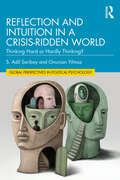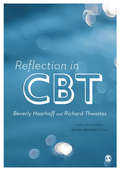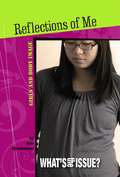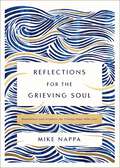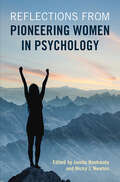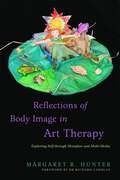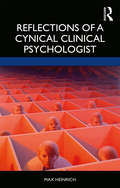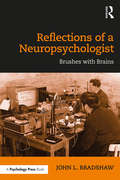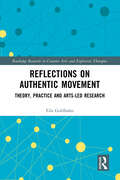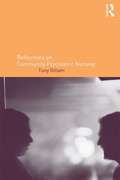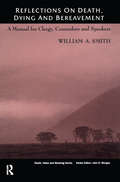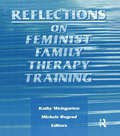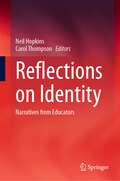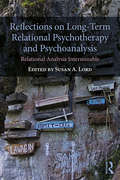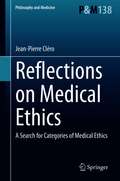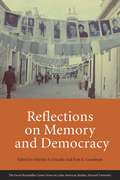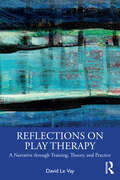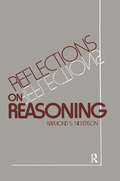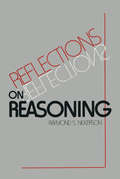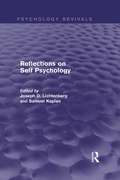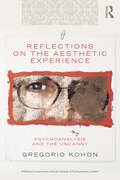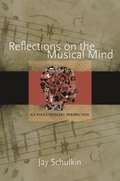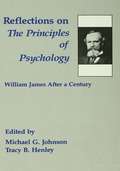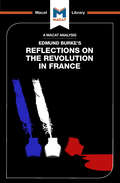- Table View
- List View
Reflection and Intuition in a Crisis-Ridden World: Thinking Hard or Hardly Thinking? (Global Perspectives in Political Psychology)
by S. Adil Saribay Onurcan YilmazThis book provides a definitive guide to the value of reflective thinking in the modern world, showing how today’s most fundamental problems are, to an important degree, based on citizens’ thinking styles.The authors highlight the importance of reflection by systematically revealing the causes underlying differences in people’s thinking styles and the consequences of thinking in different ways. These different ways of thinking contribute to socio-political views, and can result in misunderstandings of complex issues such as beliefs in conspiracy theories and fake news, anti-vaccine attitudes, and even fundamentalism and extremism. By training and strengthening reflective thinking in society, via education and other means, we can encourage individuals to challenge misinformation, and their own belief systems around controversial topics. The book also explores the idea that reflection is not enough on its own and examines the shortcomings of reflection and the other skills that complement it positively, especially holistic and systems thinking. In doing so, the authors highlight how implementing a solid, science-based understanding of key issues in education and society at large, can contribute to the solution of problems, from climate change to economic inequality.By showing how we can put our reflective capacity to good use, alongside critically examining reflection in relation to modern problems experienced by humanity, this book is a fascinating reading for students, researchers, and academics in psychology, politics, and the broader social sciences.
Reflection in CBT
by Richard Thwaites Beverly HaarhoffDeveloping skills and competency in CBT is a complex process of which self-observation and self-reflection are an essential part. In this new book, leading figures Beverly Haarhoff and Richard Thwaites outline the rationale for a focus on self-reflective practice in CBT, before offering practical and accessible guidelines demonstrating how this can be achieved in training and practice. Highlighting relevant research throughout and using case studies to illustrate theory in practice, ten chapters consider: - reflection in training and in supervision and self-supervision, - reflecting on the therapeutic relationship, on our sociocultural perceptions and biases and on client feedback - how reflection is vital to self-care and to becoming a better therapist, supervisor and trainer. This is an essential read for trainees in both high and low intensity CBT programmes, those on broader CBT courses, and for qualified practitioners working independently to enhance their self-reflective capacity.
Reflection in CBT
by Richard Thwaites Beverly HaarhoffDeveloping skills and competency in CBT is a complex process of which self-observation and self-reflection are an essential part. In this new book, leading figures Beverly Haarhoff and Richard Thwaites outline the rationale for a focus on self-reflective practice in CBT, before offering practical and accessible guidelines demonstrating how this can be achieved in training and practice. Highlighting relevant research throughout and using case studies to illustrate theory in practice, ten chapters consider: - reflection in training and in supervision and self-supervision, - reflecting on the therapeutic relationship, on our sociocultural perceptions and biases and on client feedback - how reflection is vital to self-care and to becoming a better therapist, supervisor and trainer. This is an essential read for trainees in both high and low intensity CBT programmes, those on broader CBT courses, and for qualified practitioners working independently to enhance their self-reflective capacity.
Reflections Of Me: Girls And Body Image
by Kris HirschmannReflections of Me GIRLS AND BODY IMAGE You can't escape it. Images on TV and in magazines send messages about how your body should look. You might even feel as if your friends are judging your body. What's a girl to do? This hook in the What's the Issue? series looks at how these messages can lead to body-image problems and disorders for girls of all ages. It also will give you the tools to make choices so you can develop a healthy body image.
Reflections for the Grieving Soul: Meditations and Scripture for Finding Hope After Loss
by Mike NappaAs you mourn the loss of a loved one, this collection of intimate personal reflections, Scripture, and heartfelt prayers from a fellow griever offers comfort and hope in the days, months, and beyond as you navigate life after loss.The funeral comes and goes, and you're forced to deal with the chasm your loved one left behind. But grief doesn't operate on a predictable timeline. You may find yourself somewhere you didn't expect—drowning, kicking, or screaming—long after your loss. You may feel unable to talk to others—or to God.In Reflections for the Grieving Soul, widower and author Mike Nappa comes alongside you in your saddest hour, offering support and empathy. He gives you words of Scripture to meditate on at whatever pace you need, personal reflections from his own grief after losing his beloved wife, Amy, and accessible prayers for when you don&’t know how or what to pray. This honest and moving collection offers:Comfort as you seek God in your griefUnderstanding about the regret, fear, and anger you may feelPowerful Bible verses to meet you in your loss and painHonest prayers to help you cry out to God Whether you've lost someone you love or know someone who is grieving, this comforting book is a balm for weary souls and a source of peace in the most difficult times.
Reflections from Pioneering Women in Psychology
by Jamila Bookwala Nicky J. NewtonThis volume traces the life journeys of a cohort of influential and transformative women in psychology, now in or nearing retirement, who have changed the discipline and the broader world of academia in significant ways. The 26 reflective essays record how these scholars thrived in an academic landscape that was often, at best, unwelcoming, and, at worst, hostile, toward them. They explicitly and implicitly acknowledge that their paths were inextricably linked with the evolution of women's roles in society; they highlight and celebrate their achievements as much as they acknowledge and recognize the obstacles, barriers, and hurdles they overcame. They tell their stories with candor and humor, resulting in a compilation of inspiring essays. The end result of these individual narratives is a volume that provides a unique resource for current and future academics to help them navigate through the crossroads, curves, and challenges of their own careers in academia.
Reflections of Body Image in Art Therapy: Exploring Self through Metaphor and Multi-Media
by Richard Carolan Margaret R HunterRecognising that problems with body image are often the lead cause of eating disorders, therapists are increasingly looking for innovative and effective ways to address these issues with clients. This book is packed with simple, inexpensive art-based activities that use a range of media to engage with common body image concerns openly and creatively. The activities employ basic principles from Behavioral Therapy including mindfulness and emotion regulation and use common and familiar objects to create a reassuring environment. Discussion and evaluation are encouraged throughout to enhance awareness and appreciation of self. All the exercises, and their objectives, are thoroughly explained with illustrative case studies and sample artworks from the author's extensive therapeutic experience. These adaptable art exercises will be the perfect resource for any professional to promote healthy body image in group or individual work, with girls and women. They can be used as preventative strategies with girls still developing their identities, and will be especially useful at all stages of eating disorder treatment programs.
Reflections of a Cynical Clinical Psychologist
by Max HeinrichPresenting first-hand accounts from the ‘front line’, Reflections of a Cynical Clinical Psychologist provides the reader with a participant experience of the daily ups and downs of a US mental health professional. Vividly describing actual clinical events ranging from tragic to comedic, this book calls attention to the human realities of the system’s dysfunction. Illustrated throughout by anecdotes based on the author’s 50 years of experience and observations in the field, the book focuses on ‘the system’ as the problem, identifying the limitations in current mental health policy with the emphasis misplaced onto profit rather than optimal patient care. These anecdotes are organized by themes such as the harsh treatment of patients by staff; loss in the workplace; anomalous staff behavior; problems with the legal system; and clinically unexpected and bizarre episodes. The value of humor as a stress reducer, social leveler and a means to make incisive points is highlighted throughout. This is important reading for mental health professionals, policy makers and those interested in humanizing social policy.
Reflections of a Neuropsychologist: Brushes with Brains
by John L. BradshawReflections of a Neuropsychologist: Brushes with Brains follows the life of an influential neuropsychologist's fascinating and varied career. Unique in its autobiographical approach, it features coverage of research into human evolution, archaeology and neurology. Beginning with his earliest memories (and implications for memory processes), John L. Bradshaw reflects on his archaeological expeditions preceding his primary career as a physiological psychologist and a behavioural neuroscientist. His influential research covers such rare neurological disorders as Huntington’s disease, Friedreich ataxia and Williams syndrome, and more common maladies like Parkinson’s and Alzheimer’s diseases, stroke, Fragile X, Tourette’s syndrome, obsessive compulsive and attention deficit hyperactivity disorders, schizophrenia, autism and depression. His fascinating personal experiences illustrating scientific discoveries will entertain, enthuse, encourage and inspire, and provide established research scientists and practising clinicians with a unique road map.
Reflections on Authentic Movement: Theory, Practice and Arts-Led Research (Routledge Research in Creative Arts and Expressive Therapies)
by Eila GoldhahnThis ground-breaking book advances the existing literature on Authentic Movement with an arts practice-led research monograph. It explores the history, practice and theory of Authentic Movement which integrates the fields of dance, movement and psychotherapy. Providing a contemporary and new perspective, the book moves beyond the purely therapeutic and spiritual aims of Authentic Movement and opens it up to new applications. The first part of the book introduces the history and practice of Authentic Movement, describing and illustrating origins, forms and specific expert terminology and explaining their rationale. It then develops an in-depth analysis of particular aspects of Authentic Movement, from the perspective of an expert practitioner using philosophy and the lens of art making. Case studies exemplify how the practices and qualities of Authentic Movement can aid creative, reflective research processes in dance, movement, therapy and research as well as in choreography, pedagogy, psychotherapy and natural sciences. The book emphasises a philosophical and scholarly approach which is rooted in interdisciplinary arts practices and psychotherapy. The book offers a solid grounding and guide to Authentic Movement will be accessible to scholars and students of Dance Movement Therapy, as well as counsellors, dancers, choreographers, psychotherapists and researchers in the arts and humanities.
Reflections on Community Psychiatric Nursing
by Tony GillamReflections on Community Psychiatric Nursing provides new insights into many aspects of the CPN's work. Written by a practising CPN , this is a lively and easy-to-read introduction to the key debates in community mental health, covering issues including: * professional identity* the community and the role of the nurse* teaching, assessment and clinical supervision* good practice and the concept of risk* mental health promotion* user involvement* treatment, from medication to psychosocial interventions.This text is essential reading for students and those undertaking further training as CPN's. In addition, practising nurses and other professionals will find it useful in developing their own reflective practice as well as offering a useful overview of an increasingly important area of nursing.
Reflections on Death, Dying and Bereavement: A Manual for Clergy, Counsellors and Speakers (Death, Value and Meaning Series)
by William A SmithThe methodology of "Reflections on Death, Dying and Bereavement" is mainly philosophical. It is intended to complement scriptural and theological studies. The volume has five main sections that are further divided by chapter. The first section contains foundational considerations. Since the belief in a continuation of life after death or reunion with deceased loved ones offers consolation to many people, the book examines the possibility of human immortality. Various rational arguments are also presented.
Reflections on Feminist Family Therapy Training (Journal Of Feminist Family Therapy Ser.)
by Michele Bograd Kaethe WeingartenAlthough feminist family therapy has been gaining recognition and followers in recent years, little is known about the variety of experiences, philosophies, and private learnings of feminist practitioners. Reflections on Feminist Family Therapy Training utilizes first-person accounts, theory, and commentary to explore the challenges feminist teachers and practitioners face and the aspects of their practice that are seldom considered.Readers of Reflections on Feminist Family Therapy Training acquire effective teaching strategies and a sensitivity to the intersection of cultural diversity and feminism. Students are introduced to several contextual factors that shape personal and professional experiences, as well as techniques that address predictable patterns of behavior and attitudes toward feminist family therapy in a variety of settings. The book presents innovative ideas and strategies from experienced trainers for tolerating, working with, and resolving gaps between theory and practice and for confronting hostility or tension within specific institutional contexts.Aimed at building bridges between teachers and practitioners of family therapy from a feminist perspective, Reflections on Feminist Family Therapy Training explores and helps you answer the following questions: What similarities and differences exist between American and European feminist family therapists? What special challenges does the feminist therapist face in a conventional training institute? Does a feminist or liberal context attend adequately to the needs of the multicultural student body? How does a trainer&’s national standing or tenure status promote or harm her freedom to practice openly in a specifically feminist way? What new directions and opportunities exist for feminist family therapists?Reflections on Feminist Family Therapy Training looks at the difficulties women practitioners face in convincing family therapy to recognize the significance of gender as a variable factor. In doing so, it offers specific classroom applications and general approaches to the feminist task of getting unheard and repressed voices acknowledged. Finally, the book outlines future directions for expanding and improving feminist-informed training and for giving it a more central and integrated position in the curricula.
Reflections on Identity: Narratives from Educators
by Carol Thompson Neil HopkinsThis book seeks to extend perspectives on professional identity in education. Chapters consider the notion of expertise, the impact of managerial approaches, the importance of communities of practice, and the effects of increasingly marketised approaches.By using narratives, the book opens up a ‘conversation’ about this important topic. Educators and leaders from a variety of settings will explore their professional experiences and the impact these have had on forming values in the professional role. By drawing on personal experience, individual authors will consider some of the challenges they have encountered as part of identity formation. The significance of organisational cultures is discussed throughout the book and explores the ways in which individual autonomy is both threatened and claimed. Issues discussed include the frequent changes imposed through government initiatives and the social perception of education professionals when compared to other professional roles. Contributions have been drawn from teachers and leaders in schools, colleges, universities and specialist training. Chapter authors have a variety of experiences offering a multi-perspective approach. This will include strategic leadership, operational management and classroom practice, all of which offer insights of interest to educators at various points on the professional journey. The narrative approach adopted by authors provides the opportunity for readers to engage with others’ experiences, enabling personal reflection on their own professional identity.
Reflections on Long-Term Relational Psychotherapy and Psychoanalysis: Relational Analysis Interminable
by Susan A. LordReflections on Long-Term Relational Psychotherapy and Psychoanalysis explores how relational analysts think about and pursue long-term therapeutic relationships in their practices. Many therapists work intensively with their clients over many years and don't necessarily talk about their work. More exploration is needed into what is taking place inside of these long-term relationships. The chapters cover a range of topics that focus on aspects of the therapeutic relationship that are unique to long-term psychoanalytic work. They include work with various issues such as trauma, death and dying, cross-cultural issues, suffering, mourning, neuropsychoanalysis, unique endings, attachment, intimacy, and the many ways in which therapists change along with their clients as they go through life stages together. Reflections on Long-Term Relational Psychotherapy and Psychoanalysis will be of great interest to psychoanalysts, psychodynamic psychotherapists, psychologists, social workers, workers in other mental health fields, graduate students, and anyone who is interested in change processes.
Reflections on Medical Ethics: A Search for Categories of Medical Ethics (Philosophy and Medicine #138)
by Jean-Pierre CléroThis book questions the notions of person, personality, dignity, and other connected notions such as (informed) consent, and discusses new perspectives on categories that allow ethical debates in medicine to overcome morals and ordinary religious schemes. The book states that one has to be careful when thinking about situations in terms of notions and principles that have been obtained in similar situations. Though this book is mostly philosophical, it is also of great practical interest to healthcare givers. It warns caregivers not to rely too much on notions such as person, autonomy, and consent, which are supposedly firm but can be proven to be unreliable in spite of appearances. Furthermore, this work warns against a narrow anthropologisation of ethics which would make technophobian positions unavoidable. On the contrary, this book is open to robotics and offers – among other things - a sustained exploration of the notion of intimacy.
Reflections on Memory and Democracy
by Merilee S. Grindle Erin E. GoodmanWhat is the role of history in the life of new democracies? In this volume, twelve reflections-the work of journalists, writers and poets, literary critics, political scientists, historians, philosophers, economists, and linguists-explore legacies of authoritarian political regimes noted for repression and injustice, questioning how collective experiences of violence shape memory and its relevance for contemporary social and political life in Latin America. The past matters deeply, the essayists agree, but the past itself is debatable and ambiguous. Avoiding its repetition introduces elusive and contested terrain; there are, indeed, many histories, many memories, and many ways they can be reflected in democratic contexts. In much of contemporary Latin America, this difficult past has not yet been fully confronted, and much remains to be done in reconciling memory and democracy throughout the region. As this is done, the lessons of the past must contribute not only to the construction of democratic institutions, but also to the engagement of democratic citizens in the collective work of governance and participation.
Reflections on Play Therapy: A Narrative through Training, Theory, and Practice
by David Le VayThis book explores an extensive range of questions and challenges within the training, theory, and practice of play therapy, with the aim of providing a stimulating and thought-provoking debate around many of the issues and dilemmas therapists experience.Drawing upon the author’s own experience as both a therapist and trainer/educator/supervisor, the volume grapples with questions of power, privilege, self-care, and mental health. It additionally addresses the wider challenges and impact of the Covid-19 pandemic, climate change, and international conflict upon practice and personhood. Questions around training are explored as well as specific practice challenges relating to managing limits and boundaries within play therapy and working with adopted children. Throughout the book, the author will reflect upon aspects of personal and clinical experience, sharing something of his own developmental narrative through training, teaching, and practice.Reflections on Play Therapy will serve as a core text for trainee play therapists and also a valuable resource for any experienced clinicians working therapeutically with children, young people, and families.
Reflections on Reasoning
by Raymond S. NickersonThis book is an adaptation of a report entitled Notes about Reasoning, prepared under a project on The Training of Higher Cognitive Learning and Thinking Skills that was sponsored by the National Institute of Education. My purpose in producing the notes was to help me clarify my own thinking about reasoning and how the ability to reason effectively might be enhanced in the classroom. I did not intend to write a textbook on reasoning or a scholarly review of research on reasoning processes, and this book is not presented as either now. It still has the character of a collection of thoughts; it is being published with the hope that some of the ideas and suggestions in it may stimulate some others, especially teachers and students, to reflect more than they otherwise might have upon what it means to reason effectively. One does not, of course, become an effective reasoner by reading a book on reasoning or by taking a course in reasoning. Learning to reason well is surely a lifelong process—or at least a lifelong challenge. If this book is useful in helping some readers to see the value of an enduring commitment to that challenge, it will have served its purpose. I wish to thank the NIE Project Officers, Patricia Butler and Joseph Psotka, for their support and encouragement. I am grateful also to John Swets, Richard Herrnstein, David Perkins and Carol Chomsky for helpful comments on an early draft of the manuscript, to Anne Kerwin and Patricia Carroll for typing the manuscript and to Brenda Starr and Frank DiPace for making electronic delivery of it to the printer possible by working around the differences between the sending and receiving systems. Special thanks to my wife, Doris, for her constant help of countless types, and most especially for bringing into the world the four beautiful people to whom this book is dedicated.
Reflections on Reasoning
by Raymond S. NickersonFirst published in 1986. Routledge is an imprint of Taylor & Francis, an informa company.
Reflections on Self Psychology (Psychology Revivals)
by Joseph D. Lichtenberg and Samuel KaplanOriginally published in 1983, Reflections on Self Psychology records the development of a powerful initiative to alter psychoanalytic theory and practice, and an evaluative questioning of this initiative. It presents a dialogue that developed at the Boston Symposium of 1980 between vigorous proponents of self psychology, equally energetic critics, and many participants between these polar positions. This book attempts to capture within its pages not only the content of what was presented, explored, and evaluated in Boston, but also a sense of the people, about 1,000 strong, who exchanged their ideas on and off the podium – and the remarkable spirit of open inquiry that invigorated these proceedings. The book, as was the meeting, is organized to explore four subjects: the development of the self: infant research; the implications of self psychology for psychoanalytic practice; self psychology and psychotherapy; and the implications of self psychology for psychoanalytic theory. The final section of the book is devoted to an essay by Heinz Kohut that provides an integrated response to the issues and criticisms raised in the course of the symposium. This essay while based on extemporaneous responses by Kohut during different phases of the meeting, is, in its written version, a cohesive, carefully revised, and edited statement prepared in the mellowing period following the meeting and before Kohut’s untimely death.
Reflections on the Aesthetic Experience: Psychoanalysis and the uncanny (The New Library of Psychoanalysis 'Beyond the Couch' Series)
by Gregorio KohonInterest in the relationship between psychoanalysis and art - and other disciplines - is growing. In his new book Reflections on the Aesthetic: Psychoanalysis and the uncanny, Gregorio Kohon examines and reflects upon psychoanalytic understandings of estrangement, the Freudian notions of the uncanny and Nachträglichkeit, exploring how these are evoked in works of literature and art, and are present in our response to such works. Kohon provides close readings of and insights into the works of Franz Kafka, Jorge Luis Borges, Louise Bourgeois, Juan Muñoz, Anish Kapoor, Richard Serra, Edvard Munch, Kurt Schwitters, amongst others; the book also includes a chapter on the Warsaw Ghetto Monument and the counter-monument aesthetic movement in post-war Germany. Kohon shows how some works of art and literature represent something that otherwise eludes representation, and how psychoanalysis and the aesthetic share the task of making a representation of the unrepresentable. Reflections on the Aesthetic is not an exercise in "applied" psychoanalysis; psychoanalysis and art are considered by the author in their own terms, allowing a new understanding of the aesthetic to emerge. Kohon’s book makes compelling reading for psychoanalysts, psychotherapists, art therapists, literary and art critics, academics, students and all those interested in the matter of the aesthetic.
Reflections on the Musical Mind: An Evolutionary Perspective
by Jay SchulkinWhat's so special about music? We experience it internally, yet at the same time it is highly social. Music engages our cognitive/affective and sensory systems. We use music to communicate with one another--and even with other species--the things that we cannot express through language. Music is both ancient and ever evolving. Without music, our world is missing something essential.In Reflections on the Musical Mind, Jay Schulkin offers a social and behavioral neuroscientific explanation of why music matters. His aim is not to provide a grand, unifying theory. Instead, the book guides the reader through the relevant scientific evidence that links neuroscience, music, and meaning. Schulkin considers how music evolved in humans and birds, how music is experienced in relation to aesthetics and mathematics, the role of memory in musical expression, the role of music in child and social development, and the embodied experience of music through dance. He concludes with reflections on music and well-being. Reflections on the Musical Mind is a unique and valuable tour through the current research on the neuroscience of music.
Reflections on the Principles of Psychology: William James After A Century
by Michael G. Johnson Tracy B. HenleyThis important volume looks back to 1890 and -- 100 years later -- asks some of the same questions William James was asking in his Principles of Psychology. In so doing, it reviews our progress toward their solutions. Among the contemporary concerns of 1990 that the editors consider are: the nature of the self and the will, conscious experience, associationism, the basic acts of cognition, and the nature of perception. Their findings: Although the developments in each of these areas during the last 100 years have been monumental, James' views as presented in the Principles still remain viable and provocative. To provide a context for understanding James, some chapters are devoted primarily to recent scholarship about James himself -- focusing on the time the Principles was written, relevant intellectual influences, and considerations of his understanding of this "new" science of psychology. The balance of this volume is devoted to specific topics of particular interest to James. One critical theme woven into almost every chapter is the tension between the role of experience (or phenomenological data) within a scientific psychology, and the viability of a materialistic (or biologically reductive) account of mental life. Written for professionals, practitioners, and students of psychology -- in all disciplines.
Reflections on the Revolution in France
by Riley QuinnEdmund Burke’s 1791 Reflections on the Revolution in France is a strong example of how the thinking skills of analysis and reasoning can support even the most rhetorical of arguments. Often cited as the foundational work of modern conservative political thought, Burke’s Reflections is a sustained argument against the French Revolution. Though Burke is in many ways not interested in rational close analysis of the arguments in favour of the revolution, he points out a crucial flaw in revolutionary thought, upon which he builds his argument. For Burke, that flaw was the sheer threat that revolution poses to life, property and society. Sceptical about the utopian urge to utterly reconstruct society in line with rational principles, Burke argued strongly for conservative progress: a continual slow refinement of government and political theory, which could move forward without completely overturning the old structures of state and society. Old state institutions, he reasoned, might not be perfect, but they work well enough to keep things ticking along. Any change made to improve them, therefore, should be slow, not revolutionary. While `Burke’s arguments are deliberately not reasoned in the ‘rational’ style of those who supported the revolution, they show persuasive reasoning at its very best.
